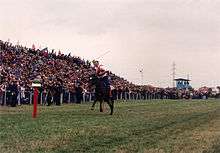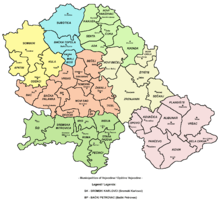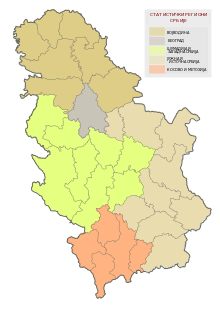Požarevac
| Požarevac Пожаревац | ||
|---|---|---|
| City and municipality | ||
| City of Požarevac | ||
|
Downtown | ||
| ||
 Location of the municipality of Požarevac within Serbia | ||
| Coordinates: 44°37′N 21°11′E / 44.617°N 21.183°ECoordinates: 44°37′N 21°11′E / 44.617°N 21.183°E | ||
| Country | Serbia | |
| District | Braničevo | |
| Municipalities | 2 | |
| Settlements | 27 | |
| Government | ||
| • Mayor | Bane Spasović (SNS) [1] | |
| Population (2011 census)[2] | ||
| • Town | 44,183 | |
| • Municipality | 75,334 | |
| Time zone | CET (UTC+1) | |
| • Summer (DST) | CEST (UTC+2) | |
| Postal code | 12000 | |
| Area code | +381 12 | |
| Car plates | PO | |
| Website |
www | |
Požarevac (Serbian Cyrillic: Пожаревац) is a city in eastern Serbia. It is located between three rivers: Danube, Great Morava and Mlava. It is the administrative centre of the Braničevo District of Serbia. In 2011, the city had a population of 44,183 and its municipal area 75,334.
Name
In Serbian, the city is known as Požarevac (Пожаревац), in Romanian as Pojarevaţ, in Turkish as Pasarofça, in German as Passarowitz, and in Hungarian as Pozsarevác.
The name means "fire-town" in Serbian (Here "fire" is in the sense of a disaster).
History
Ancient times
In ancient times, the area was inhabited by Thracians, Dacians, and Celts. There was a city at this locality known as Margus in Latin after the Roman conquest in the first century BC.
In 435, the city of Margus, under the Eastern Roman Empire, was the site of a treaty between the Byzantine Empire and the Hun leaders Attila and Bleda.
One pretext for the Hun invasion of the Eastern Roman Empire in 442 was that the Bishop of Margus had crossed the Danube to ransack and desecrate the royal Hun graves on the north bank of the Danube. When the Romans discussed handing over the Bishop, he slipped away and betrayed the city to the Huns, who then sacked the city and went on to invade as far as the gates of Constantinople itself.
After the fall of the Hunnic Empire, the area was again controlled by the Eastern Roman Empire. In the 6th century, it was briefly controlled by the Kingdom of the Gepids. Since the 6th century, the area was populated by Slavs, but the Eastern Roman Empire held a nominal control over the region until the 8th century when Balkan Slavs achieved de facto independence from the Eastern Empire. It was also ruled by Avar Khaganate before their demolition by Charlemagne. The area was subsequently included into the Bulgarian Empire and was alternately ruled by the Bulgarian Empire, the Byzantine Empire and the Kingdom of Hungary until the 13th century.
In the 13th century, the area was ruled by independent local Slavic-Bulgarian rulers, Drman and Kudelin. It was subsequently included into the Kingdom of Syrmia, ruled by Serbian king Stefan Dragutin and into the Kingdom of Serbia and Serbian Empire ruled by Stefan Dušan.
Archaeology
A Bronze Age figurine "The Idol of Kličevac" was found in a grave in the village of Kličevac. It was destroyed during World War I.[3]
The National Museum in Belgrade and Požarevac has some 40,000 items found in Viminacium, of which over 700 are of gold and silver. Among them are many invaluable rarities.
In June 2008, a Triballian (Thracian) grave was found with ceramics (urns). These date from the first millennium BC.[4]
Modern city
The modern town of Požarevac was first mentioned in the 14th century under the name Puporače[5]; it first being mentioned under its present-day name in 1476.[6] The town became part of Moravian Serbia and Serbian Despotate, until the Ottoman conquest in 1459. During Ottoman administration, it was part of the Sanjak of Smederevo. It was occupied by Austrian Empire between 1688 and 1690.
In 1718, Požarevac was the site of the signing of the Treaty of Požarevac, with the town then falling under Habsburg control and becoming part of the Habsburg Kingdom of Serbia (from 1718 to 1739). After 1739, the town reverted to Ottoman control except final Austrian occpation between 1789 and 1791. During the First Serbian Uprising (1804-1813), the town was part of the Karađorđe's Serbia. At the end of the uprising in 1813, the town came briefly once more under direct Ottoman control. However, following the Second Serbian Uprising from 1815, the town then became part of the autonomous Ottoman Principality of Serbia. Požarevac was the second capital of the Serbian prince, Miloš Obrenović with the first regular state court in Serbia being established here in 1821. Since 1878, Požarevac became part of the independent Principality of Serbia and since 1882 as part of the Kingdom of Serbia.

Following the end of the First World War in 1918, the town was part of the Kingdom of Serbs, Croats and Slovenes (renamed the Kingdom of Yugoslavia in 1929). From 1929 to 1941, Požarevac was part of the Danube Banovina of the Kingdom of Yugoslavia. During the Axis occupation of Yugoslavia, from 1941 to 1944, it was part of the Territory of the Military Commander in Serbia. From 1944, Požarevac became part of the new socialist Serbia within socialist Yugoslavia. And from 1992, the town became part of the Federal Republic of Yugoslavia (renamed as Serbia and Montenegro in 2003). Since 2006 it has been part of the Republic of Serbia.
Municipalities and settlements
The city of Požarevac includes two urban municipalities:
These include the following settlements:
In the 2008 reform of Serbian local government, Požarevac received the status of a city and the town of Kostolac became the seat of the second city municipality. Požarevac is the smallest Serbian city consisting of two municipalities.
Demographics
| Historical population | ||
|---|---|---|
| Year | Pop. | ±% |
| 1900 | 12,980 | — |
| 1905 | 12,162 | −6.3% |
| 1910 | 13,613 | +11.9% |
| 1921 | 11,500 | −15.5% |
| 1931 | 14,042 | +22.1% |
| 1941 | 16,300 | +16.1% |
| 1948 | 15,474 | −5.1% |
| 1953 | 18,529 | +19.7% |
| 1961 | 24,269 | +31.0% |
| 1971 | 32,828 | +35.3% |
| 1981 | 39,735 | +21.0% |
| 1991 | 41,160 | +3.6% |
| 2002 | 41,736 | +1.4% |
| 2011 | 44,183 | +5.9% |
Ethnic groups in the Požarevac municipality (2011 census):
- Total = 75,334
Politics
Seats in the municipality parliament won in the 2004 local elections:[7]
- Socialist Party of Serbia (16)
- Democratic Party (15)
- Serbian Radical Party (10)
- Democratic Party of Serbia (9)
- Strength of Serbia Movement (8)
- Coalition "Because of Požarevac" (6)
- G17 Plus (4)
Seats in the municipality parliament won in the 2008 local elections:
- Democratic Party (26)
- Serbian Radical Party (22)
- Socialist Party of Serbia (11)
- Democratic Party of Serbia (5)
- G17 Plus (4)
Seats in the municipality parliament won in the 2012 local elections:
- Socialist Party of Serbia (18)
- Serbian Progressive Party (17)
- Democratic Party (17)
- United Regions of Serbia (6)
- Turnover (5)
- Serbian Radical Party (5)
Seats in the municipality parliament won in the 2016 local elections:
- Serbian Progressive Party (38)
- Socialist Party of Serbia (17)
- Democratic Party (6)
- Civil Group "Iskorak"(4)
- Minority Lists (3)
Education
- Požarevac Gymnasium (Požarevačka gimnazija), a co-educational high-school
- Technical College (Visoka tehnička škola strukovnih studija u Požarevcu)[8]
People associated with Požarevac
- Patriarch Dimitrije
- Dragana Mirković, singer
- Novica Urošević, singer and composer
- Milena Pavlović-Barili painter and poet
- Saša Ilić, footballer
- Velibor Vasović football player and manager
- Milivoje Živanović, film and stage actor
- Bata Paskaljević, stage, film, and television actor
- Slaviša Žungul, football player
- Prvoslav Vujčić, writer
- Đorđe Jovanović, sculptor
- Milenko Stojković, army commander
- Radmila Manojlović, singer
- Slobodan Milošević, politician
- Stefan Milošević, football player, World U-20 champion
- Slobodan Stojanovic, writer
International relations
Twin towns – sister cities
Požarevac is twinned with:
|
Gallery
 Municipal Assembly of Požarevac
Municipal Assembly of Požarevac Downtown
Downtown Downtown (1980s)
Downtown (1980s) Požarevac Park
Požarevac Park Miloš Obrenović statue in the city park
Miloš Obrenović statue in the city park Regional History Museum
Regional History Museum Čačalica Memorial Park
Čačalica Memorial Park Old coat of arms
Old coat of arms
See also
References
- ↑ https://pozarevac.rs/bane-spasovic-gradonacelnik-pozarevca/
- ↑ "2011 Census of Population, Households and Dwellings in the Republic of Serbia: Comparative Overview of the Number of Population in 1948, 1953, 1961, 1971, 1981, 1991, 2002 and 2011, Data by settlements" (PDF). Statistical Office of Republic Of Serbia, Belgrade. 2014. ISBN 978-86-6161-109-4. Retrieved 2014-06-27.
- ↑ "[Projekat Rastko] Dr Draga Garasanin: Bronze Age in Serbia". Rastko.rs. Retrieved 2013-09-30.
- ↑ http://www.jasatomic.org.yu/?postid=7953
- ↑ "Požarevac, Kostolac, Malo Crniće, Petrovac « National Tourism Organisation of Serbia". Serbia.travel. Retrieved 2013-09-30.
- ↑ "Историјат". Pozarevac.rs. Retrieved 2013-09-30.
- ↑ Archived September 27, 2007, at the Wayback Machine.
- ↑ "ВТШСС Пожаревац". Vts-pozarevac.edu.rs. 2013-09-20. Retrieved 2013-09-30.
- ↑ Volokolamski pravac
External links
| Wikimedia Commons has media related to Požarevac. |
-
 Požarevac travel guide from Wikivoyage
Požarevac travel guide from Wikivoyage - Grad Požarevac
- Facebook Group Požarevac
- Social network Požarevac




